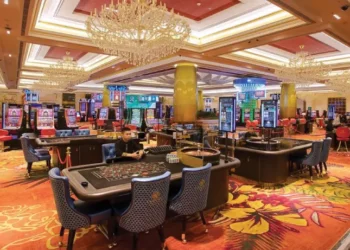JAN 30 — In a few short years, Macau has elbowed Las Vegas aside to become the casino capital of the world. Its 2008 gaming revenue hit an all-time high of 109.9 billion Macau patacas (RM50 billion), almost double that of Las Vegas’.
Its stellar performance defied a 2006 forecast by the Gaming Inspection and Coordination Bureau (DICJ) that it would take Macau four years for its casino revenue to reach this mark. But strong growth of 47 per cent in 2007 and 31 per cent last year allowed the former Portuguese enclave to hit the target two years early.
Despite the worldwide credit crunch and China’s restrictions on mainlanders’ visits to Macau, PriceWaterhouse estimates that by 2012, total gaming revenue will almost double to 192 billion patacas while Deutsche Bank puts it at 230 billion patacas.
While Beijing is no doubt happy to see the former Portuguese enclave doing well less than a decade after being returned to Chinese sovereignty, it has to weigh some of the possible social consequences of its hectic growth. Beijing has three main concerns.
Foremost is the magnitude of capital flight via Macau. The Chinese Public Security Ministry estimates that between 2003, when Macau liberalised gaming, and 2007, a total of 600 billion yuan (RM316 billion) was lost to casinos and gambling in Macau, North Korea, Cambodia and Myanmar.
This sum is 15 times the total revenue derived from domestic betting such as welfare lotteries in 2003. The bulk of the money — state funds in most cases — was lost in Macau’s casinos.
The report warned that unless the government took urgent measures, the illicit flight of capital would turn Macau into a money-laundering hub, seriously threaten China’s financial stability and derail the Chinese Communist Party’s anti-corruption efforts.
The second concern is political. As huge amounts of American casino investment capital have flowed into tiny Macau, there is growing concern that US political influences will soon follow.
Of the six operators licensed to operate casinos in Macau after 2003, three are from the United States. According to the DICJ, the US operators had invested US$20 billion (RM72 billion) by 2007. They employ close to 30,000 people, making them the biggest employers in Macau.
Professor Zou Xueping of Shenzhen University’s Law School is worried that pro-Beijing political forces would no longer hold sway in Macau. He advises taking measures to prevent local legislative elections from returning candidates who are likely to champion American interests.
Professor Kuai Che of Beijing University’s Research Centre for Contemporary China has warned that by 2010, American casino operators will dominate the gaming sector in Macau.
Kuai goes so far as to suggest that the former US government’s allegations that several Macau banks and corporations were involved in laundering money for North Korea were meant to weaken traditional local business interests and bring the Macau government to its knees.
The academic also fears that as the US presence in Macau rises, its influence on local society could lead to undesirable developments, such as calls for democracy.
Others who frown on the US presence have argued that the Americans grew too fat, too fast, feeding on Chinese money. Such a reaction is typical of the Chinese dictum of “not allowing fertile water to irrigate others’ fields”.
The oft-cited example is Sands Macau, which recouped its entire US$265 million investment within the first year of operation, and paid off all its debts three years ahead of schedule.
Sheldon Adelson, chairman and chief executive of Las Vegas Sands Corp, the parent company of Sands Macau, saw his personal wealth skyrocket and was ranked sixth among the world’s billionaires in 2007, with an estimated net worth in excess of US$26.5 billion.
This is reason enough for people such as Professor Zhu Xianlong, of the Social and Economics Institute of the Polytechnic of Macau, to urge the Beijing government to reconsider its ban on Chinese capital entering the gaming business. Zhu argues that lifting the ban would dilute the predominant position of American gaming companies.
Finally, Macau’s phenomenal growth poses a governance problem for Beijing. Since the casino business is often associated with money laundering, corruption and social vices, it requires strong and effective governance.
The corruption case of Ao Man Long, the disgraced former secretary for transport and public works, highlights this problem. Ao was jailed last year for 27 years on 57 counts of bribe-taking, money laundering, abuse of power and other charges. During his trial, Ao told the court that his superiors had prior knowledge of what he did. Clearly, though he stopped short of naming them, Ao’s case could implicate more people.
Then there are also social problems. According to Global View, a China-based online magazine, the Macau tourist authority has found that for every 10,000 “individual tourists” from the mainland, half of them gambled to the point of having to pawn their valuables while 30 per cent lost all their money. Only 20 per cent knew when to stop.
It is for these reasons that Beijing decided to cool the Macau gaming boom and to place restrictions on mainland Chinese travelling there. — The Straits Times



































